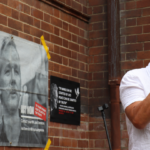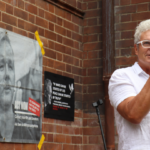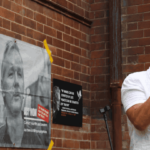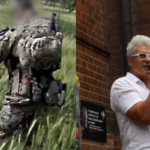Australian Government Should Be Ashamed of Imprisoning McBride
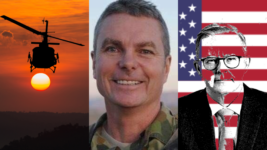
Picture troops stranded in a foreign land, beyond watch or care of government back home, which is only concerned in looking effective. Consider these soldiers don’t know their aim in a foreign conflict, as neither do their leaders. And think of them running amok, beyond any social contract.
A few years back, this might have conjured up the 1979 antiwar classic Apocalypse Now, which portrayed US army officers in Vietnam, a war without reason, with no guidance from control and no longer restrained by societal norms, casually committing war crimes bereft of any moral conscience.
Yet, this could be a description of Australian special forces operating a decade back in Afghanistan, and we’re privy to this thanks in large part to former ADF lawyer David McBride, who, last week, was imprisoned over providing classified information to the press, which exposed war crimes.
In seeing McBride – who was denied a just hearing at every turn and sentenced to 5 years and 8 months, with no chance of release for 2 years and 3 months – becoming the first person the government has locked up in relation to war crimes in Afghanistan, a clear message has been sent.
And as Australians for War Powers Reform asserts, in gaoling a lawyer who publicly exposed war crimes, the Albanese government has revealed a feigned concern for whistleblowers, as it rather supports a bipartisan hiding of official wrongdoing and the condemning of those who break rank.
Labor’s lip service
“The government claims to support whistleblowers and wants serious wrongdoing exposed but in practice it has failed badly,” said AWPR spokesperson Cameron Leckie. “The existing laws designed to protect whistleblowers are clearly inadequate and a complete overhaul is needed.”
“Without strong protections for those who reveal illegal or unethical practices, criminality will continue to flourish,” the retired Australian Defence Force major continued. “This is especially the case with war crimes or crimes against humanity.”
Back in 2018, then Liberal attorney general Christian Porter oversaw the launch of multiple whistleblower prosecutions: those against McBride, Witness K and their lawyer Bernard Collaery and ATO whistleblower Richard Boyle. And there was uproar about the execution of this revenge list.
In response to public outcry, current AG and then opposition MP Mark Dreyfus promised stronger whistleblower protections if elected. Indeed, despite his having enacted the dodgy law in 2013, the last time he held the office of chief lawmaker, he pledged to get them right this time.
And once he retook the reigns, with K already convicted, Dreyfus dropped the Collaery prosecution, and then held off announcing his reforms to the Public Interest Disclosure Act 2013 (Cth), until directly after McBride and Boyle were made to argue their defence under the bad law.
“Civil society organisations have been asking attorney general Mark Dreyfus to intervene in the McBride case for more than two years and the requests have been ignored,” Leckie further underscored.
Keep mum or go to gaol
McBride is now inside for doing what lawyers do: advocating for the rights of their clients. Then an ADF legal officer representing Australian troops and, in this zone outside of humanitarian law, he considered a few of his clients were about to be prosecuted to cover up a managerial breakdown.
The army lawyer then took his complaint to his seniors and from there on to the Inspector General of the ADF. But when nothing was done, he leaked documents to the ABC over 2014 to 2016. And in 2017 The Afghan Files report was published, which focused on and publicly exposed war crimes.
Meanwhile, the Chief of the Army launched the Brereton inquiry into Australian war crimes in Afghanistan in March 2016, based on “persistent rumours”, which climaxed in late 2020, with a recommendation that the federal police investigate 19 Australian soldiers in relation 23 incidents.
AWPR further set out in its statement that whilst McBride is now sent away for actions that exposed war crimes, “Australians are left wondering when, if ever, those who allegedly committed war crimes will face justice.”
So far only one officer has charged by the AFP: SAS soldier Oliver Schultz in March last year. And this is despite the Office of the Special Investigator having been established after the release of the findings of Brereton. And as for the Schultz case, that prosecution continues.
An inglorious record
“Now the Albanese government is facing legitimate calls from MPs and senators to pardon David McBride,” continued Leckie, and he suggested that this “should be seriously considered along with a renewed commitment to genuine transparency”.
On 16 May, the Greens and the vast majority of the crossbench delivered a letter to PM Anthony Albanese and the AG, calling for McBride to be pardoned, that the Boyle case be dropped, to overhaul the protection law and that a whistleblower protection commission be established.
But why is McBride’s fate of so much concern to a civil society group that’s attempting to secure war powers reform, which would mean the decision for this nation to enter into a foreign conflict, is made by the entire parliament and not just the PM and a few close ministers as is the case now?
Well, according to Leckie, there are good reasons, including that if parliament had been involved in the decision as to Australia following the US into war on Afghanistan in the immediate aftermath of the 2001 9/11 attacks, it’s likely Canberra would not have blindly been led by Washington.
While Albanese further betrayed war power reformists early in the term, as Labor made a preelection promise to hold a war powers inquiry, which, after launch, saw the defence and foreign ministers confirming no reform would be forthcoming, prior to the inquiry ending on the same note.
And just to show he has a wry sense of humour, Albanese then passed a law to ensure that from now on parliament can debate his decision to go to war after he makes it.
In terms of hiding war crimes, that too appears to be something of a habit, as Kellie Tranter’s latest article in Declassified Australia follows a freedom of information trail that reveals key departments pondering how to get around a genocide and any suggestion of complicity in it.
So that is, those departments trying to deny and conceal Israeli perpetration of this crime, as opposed to trying to prevent it as Australia is required to under the terms of the 1948 Convention on the Prevention and Punishment of the Crime of Genocide.
“A fundamental problem remains in that practically all of the war in Afghanistan – even the decision for Australia to join the war – remained outside our democratic processes, including our parliament,” Leckie further made the point.
“Until there is some democracy around the decision to go to war, a dangerous level of secrecy will continue to prevail,” the ex-army major said in conclusion.


